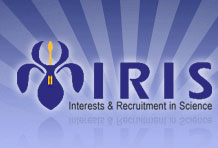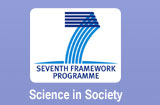Book to be published in early 2014:
Henriksen, E. K., Dillon, J., & Ryder, J. (Eds.). Understanding student participation and choice in science and technology education. Dordrecht: Springer.
IRIS presented two symposia at the ESERA conference, Cyprus, in September 2014.
IRIS presented a symposium at the NARST conference, Puerto Rico, in April 2014
IRIS writing workshops: LONDON 2012
The IRIS team gathered in February 2012 at the premises of King's College London for a writing workshop for
the IRIS book with preliminary title “Recruitment, Retention and Gender Equity in Science, technology, Engineering and Mathematics Higher Education” edited by E. K. Henriksen, J. Dillon, and J. Ryder,
which is due to be published on Springer in 2013 and which will be presented at international science education conferences such as ESERA 2013. All members of the IRIS consortium contribute in this book.
The IRIS group will gather in September 2012 for another writing workshop in London.
IRIS FINAL DISSEMINATION EVENT at PCST conference in Florence, 18.-20. April 2012
The conference gathers European in International science communication and outreach practitioners as well as policy makers from Europe. The 12th PCST Conference addressed practical and theoretical aspects of science communication, in a globalised world with particular emphasis on quality of information and communication. Over 650 science communication practitioners and analysts from all continents gathered to compare experiences and perspectives on science-based issues of today and tomorrow.
Thus the IRIS group thus presented the major findings of the project at 2 special IRIS sessions, as the final dissemination event:
1) Why choose STEM education and career? Factors influencing recruitment, retention and gender equity in science, technology and mathematics higher education.
2) Better communication for better choices; Communicative factors influencing recruitment, retention and gender equity in STEM higher education
The papers at session 1:
OPENING ADDRESS and session topic presentation: Ellen K. Henriksen, University of Oslo
Ellen K. Henriksen, Fredrik Jensen and Maria Vetleseter Bøe, University of Oslo
Why choose STEM education and career - in 5 European countries?
This paper presents and compares findings from five European countries concerning factors influencing young people's STEM participation. We draw on results from the IRIS questionnaire study to gain insight into the values, experiences and priorities that guide girls’ and boys’ choice of tertiary STEM education, and we discuss how such insight may be used to enhance recruitment and gender balance in STEM education and careers.
Jaume Ametller and Jim Ryder, School of Education, University of Leeds
The impact of science curriculum content on students’ subject choices in post-compulsory schooling.
Using individual narrative interviews we examine high school students’ (15-18 years) reflections on their subject choices. Our analysis identifies student choice as a ‘dynamic process’ rather than a rational decision made at a point in time. Science curriculum content features as one factor, alongside other in-school and out-of-school factors.
Henriette T. Holmegaard, Lene Møller Madsen, Lars Ulriksen, University of Copenhagen
The first-year experience – issues of student retention and balancing of identities at STEM higher education studies.
This paper explores how first-year STEM students need to balance ideas about themselves and about the science and technology they have encountered in school and media with what they experience when entering higher education STEM programmes.
Slavko Dolinšek, Tina Hribar, IRI UL
Why should I choose a STEM PhD?
This paper presents the results of quantitative as well qualitative study of the priorities and considerations that determine the process of choosing to become a STEM PhD student that draws from a questionnaire and interview study of 200 PhD STEM students in Slovenia.
The papers at session 2:
OPENING ADDRESS and session topic presentation: Giuseppe Pellegrini – Observa Science in Society
Science goes to Hollywood. Students and the fiction.
Public attitude research on students’ motivation regarding STEM studies highlights the influence of media and in particular the popular culture of movies. In this session, using some examples from famous science fictions, key messages will be analyzed considering the science and the social role of scientists.
Fredrik Jensen and Ellen K. Henriksen, University of Oslo
Using experiences outside of school to recruit young people to STEM education
The process of choosing an education may involve childhood experiences and interests developed over many years, as well as last-minute decisions where a recruitment campaign, popular science program, event or web site may be decisive. This paper draws on qualitative and quantitative results from the IRIS study to describe the effects of out-of-school initiatives and targeted recruitment efforts on recruiting young people to STEM education.
Marianne Løken, University of Oslo
Communicating research on educational choices; When research challenge gender stereotypes - Oral presentation
This paper explores how stereotypical public stories about girls and science are challenged by narratives written by girls who have chosen to study science subjects where they are underrepresented. I will discuss how the process of communicating broad generalizations based on sex differences stands the risk of losing important nuances that again might lead to the creation and cementation of gender stereotypes.
For details please visit the PCST web site.
IRIS at iCERI conference in Madrid, november 2011
IRIS team from IRI UL presented a paper at the conference:
Glodež, N, Hribar, T and Dolinšek, S. (2011) Young people's (and women in particular) priorities and choices related to science and technology education - case of Slovenia.
BIG Event, British Interactive Group Conference July 20th-22nd At-Bristol Science Centre, Bristol
Iris team from King's College, presented a paper at the conference:
Regan, E and Dillon, J. (2011) Choosing undergraduate courses: considerations, experiences and influences of STEM and non-STEM students in England,
IRIS symposium at ESERA conference
The IRIS partners organised a special IRIS Symposium on Friday, 9.9.2011, titled:
"Improving recruitment, retention and gender equity in STEM higher education - a report from project IRIS":
The following papers were presented at th symposium:
PAPER 1:
Interests and Recruitment in Science: Presenting the challenge, introducing project IRIS and its first results
PAPER 2:
The impact of science curriculum content on students’ subject choices in post -compulsory schooling
PAPER 3:
The right choice. Understanding the Italian male and female students’ preferences for STEM degrees
PAPER 4:
Should I stay or should I go? Student retention in STEM higher education programmes
University of Copenhagen, DENMARK
Prof. Jonathan Osborne was a discussant and offered thoughtful comments. The room which was admittedly small was packed with people and a queue formed outside in the lobby.
The IRIS team has during the conference established and strengthened important connections with related researchers and projects, such as the identity research by poeple like Ruurd Taconis in the Netherlands and Marie-Claire Shanahan from Canada, and researchers form the UPMAP project in UK (Michael Reiss and co-workers).
Keynote address at the conference in Brazil, May 2011
by Guiseppe Pellegrini (Observa):
Science, Technology and new generations. Youngsters and STEM studies.
IRIS consortium meetings
the last consortium meeting was held in Copenhagen, March 2011.
IRIS SURVEY
IRIS collected data by means of an electronic questionnaire to first-year STEM students in five European countries during the period March-June 2010 and in February - March 2011. We receieved a total of around 7200 responses.
IRIS workshop
25 participants from 15 countries participated at the workshop and presented their future involvement in IRIS project.


